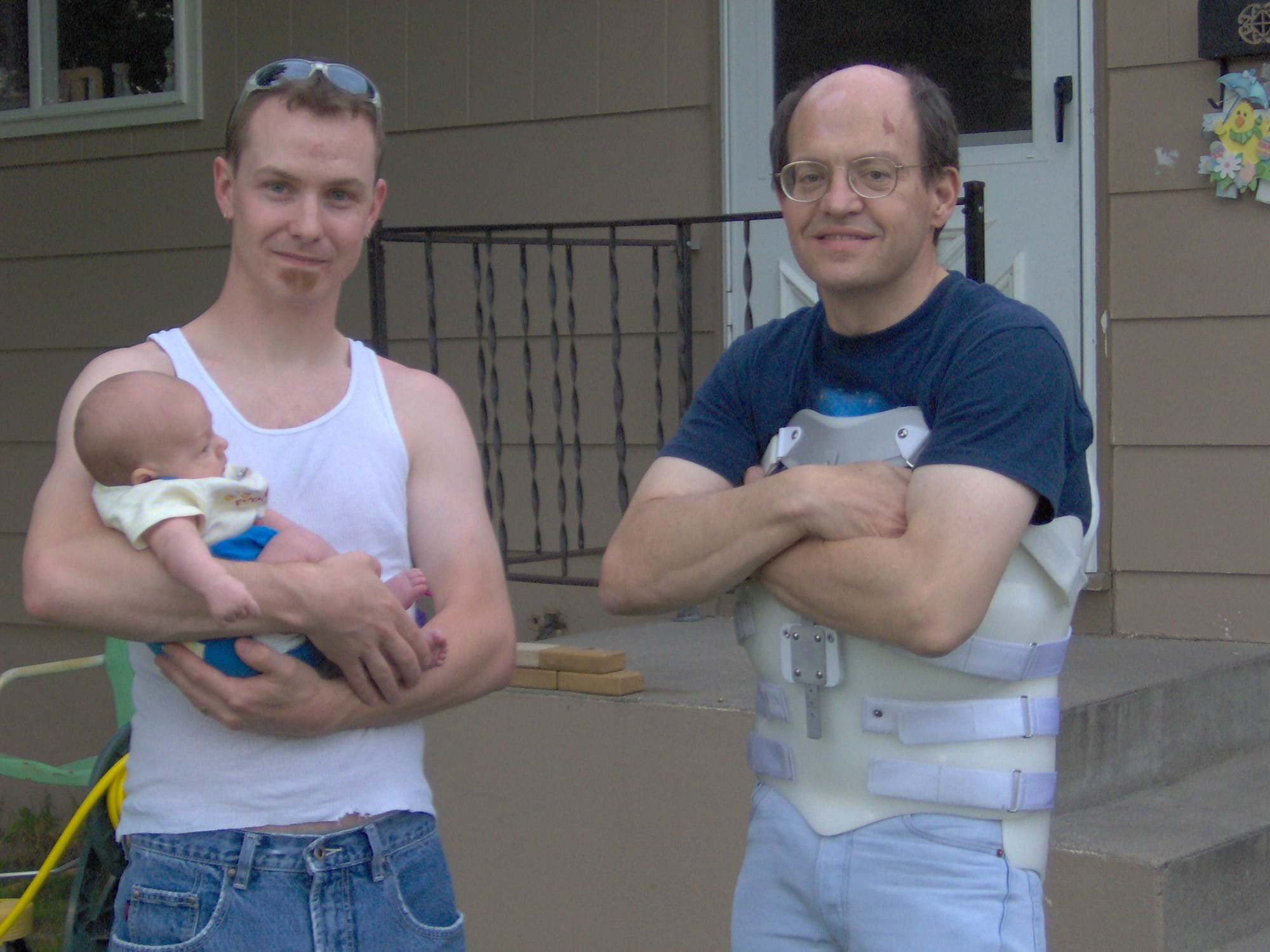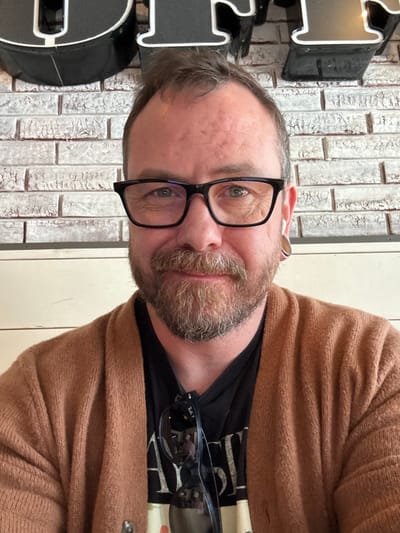My Uncle Rick used to pull up in his gray Mazda 626 — the one with stereo controls on the steering wheel, back when that felt futuristic. He always had something playing loud, something new I hadn’t heard yet. Crates of CDs in the trunk, a six-disc changer, the hum of the engine blending with whatever was next on the playlist.
He’d hand me a stack of albums like gifts: Marilyn Manson, Nine Inch Nails, Johnny Lang, Kenny Wayne Shepherd. He bought me my first guitar tuner. He made me mix tapes. Once, he even let me drive his car when I was sixteen. I probably nearly hit a parked car trying to show off to my friends. The panic on his face said it all.

The last photo I have of us was taken around 2005. He’s wearing the hard plastic back brace I used to pretend not to notice. What I didn’t realize then — or maybe couldn’t let myself see — was how much pain he was in, and how small his world had become.
As the years went on, the music stopped coming from his direction. Pain meds turned into addiction, and the surgeries that were supposed to help mostly gave him more prescriptions. My family didn’t know how to deal with it. I didn’t either. I regret that silence more than anything.
Then one day, my phone rang. My sister’s voice on the other end:
Rick had taken his own life.
I was shocked, but not surprised. And that’s a terrible kind of knowing — when the loss hits hard even though you’ve been bracing for it.
My dad’s story could have ended, too. He had his first cardiac event at 42, three years younger than I am now. By the time the third one came — the one they called a widow-maker — he recognized what his body was trying to tell him. Those earlier scares and stents had taught him to listen, and that instinct probably saved his life.
He’ll still tell you it wasn’t his heart, it was his arteries — and technically, he’s right. But when the doctors call it a widow-maker, the distinction starts to feel pretty thin.
Watching him recover, waiting months for him to get cleared for work, hearing about the side effects of the meds — it stuck with me. I didn’t want to wait until I was broken to start paying attention.
Now I’m 45. I lift. I eat well. I still fight cholesterol numbers that don’t seem fair for my habits. My doctor says sometimes it’s just genetics. Maybe so. But I’ve seen what ignoring the warning signs can do. And as my friends and I get older, I see more of us hitting that moment — where bravado meets biology. I tell them I’d recommend against growing older if the alternative weren’t so bleak.
I didn’t know about Movember when Rick was alive. I’d heard about it years later — the mustaches, the fundraising, the selfies — but writing these stories for Men Beyond Myths brought it all back with a new kind of gravity.
Why Movember Matters
Every year, more than 49,000 Americans die by suicide, and about 80% of them are men (CDC, 2024). The suicide rate for men is roughly four times higher than for women (NIMH, 2024). These aren’t statistics about strangers — they’re about the men sitting next to us at work, the ones who check in with a joke instead of a confession, and sometimes, the ones who used to drive us around with the music turned up too loud.
Men’s physical health tells a similar story. About 1 in 8 men will be diagnosed with prostate cancer in their lifetime (American Cancer Society, 2025), and nearly 41% of men in high-income countries aren’t getting enough physical activity to stay healthy (Movember Foundation, 2025).
These are preventable crises — but prevention starts with awareness, and awareness starts with talking.
Movember isn’t just about growing a mustache. It’s about growing awareness — and continuing the story.
Grow. Talk. Listen. Continue.
That’s why I’m growing a mustache this November.
For Rick, who gave me the gift of music.
For my dad, who listened when it mattered.
For the men reading this who need a reason to start paying attention — to their health, to their feelings, to each other.
If you’re struggling, please don’t do it alone. Help is available — now, today, quietly, without judgment.
You Are Not Alone – Mental Health & Suicide Resources
And if you’re ready to take even one small step — walk a few blocks, call your doctor, check in with a friend, or just grow the mustache — join us.
Join the Men Beyond Myths Movember Team
Because some stories deserve a semicolon, not a period.


